Posted June 23, 2017 by Nicky in Reviews / 0 Comments
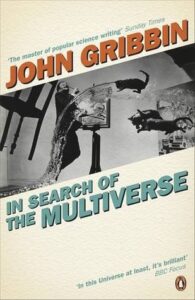 In Search of the Multiverse, John Gribbin
In Search of the Multiverse, John Gribbin
I don’t understand quantum physics or string theory, really — I couldn’t possibly explain them to someone, anyway. But I keep trying to, and this book has probably got the closest to making me really interested in the topic. It’s easy enough to follow, and doesn’t throw maths at you without explanation, and it helps that it’s focused on one of the important more interesting factors: quantum theory and string theory could require a multiverse. Gribbin has a look at all the reasons a multiverse seems likely, including the fact that quantum computing works at all, and takes you through anthropic reasoning, etc, etc.
Overall, I still find parts of this difficult to get on with. We can’t know that we live in an average universe — even if there are an infinity of different universes, that doesn’t follow that universes which are suitable for life are more common. We could be living in a rare universe. We can’t see what the probabilities of anything are when we only have experience of one universe — nobody has ever convinced me we have the data to really judge.
This is probably going to date badly when it comes to its explanations of string theory and a theory of everything, but for someone as lacking in knowledge as me, it works.
Rating: 3/5
Tags: book reviews, books, non-fiction, science
Posted June 18, 2017 by Nicky in Reviews / 3 Comments
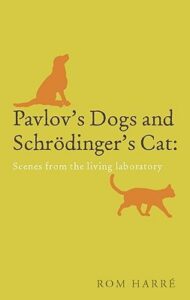
Pavlov’s Dogs and Schrodinger’s Cat, Rom Harré
I’m torn about this book: on the one hand, it does what it sets out to do pretty well. It describes experiments that happened to use living subjects, treating those living subjects as though they’re simply part of the equipment. On the other hand, it very deliberately doesn’t engage with the moral aspect of these experiments, instead choosing to present the experiments dispassionately, claiming to be unable to deal with the moral dimension.
I can appreciate this way of looking at the experiments as a way to gain an understanding of them, but I think avoiding the moral dimension in the end just seems cowardly. If it’s your point of view that the suffering of an animal is worth it for the sake of the experiments, then at least own it. Admit the distress is there.
Without addressing that aspect, this book actually comes across as very flat. I ended up losing interest in a lot of these experiments, because animals aren’t just another piece of equipment. We have to use living tissue in experiments because only living tissue responds in the weird and wonderful ways that it needs to in order to give true results. Pretending a dog is a just a petri dish that happens to be pumping blood and breathing air seems disingenuous and pointless.
If you’re interested in the purely scientific treatment of animals as just objects in an experiment, this will work fine for you — that’s what the author delivers. If you find it hard to separate the two, or like me believe that it’s our duty to at least own what we do to animals, then it may fall rather flat.
Rating: 2/5
Tags: book reviews, books, non-fiction, science
Posted June 14, 2017 by Nicky in Reviews / 3 Comments
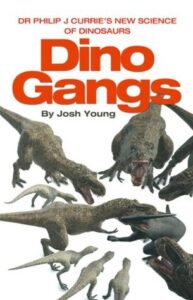 Dino Gangs, Josh Young
Dino Gangs, Josh Young
Based on the work of Philip J. Currie, the man who helped to found the Royal Tyrrell Museum in Drumheller (a very worthwhile visit if you find yourself in Alberta), this book goes into various aspects of dinosaur life, mostly focusing on the tyrannosaurid Tarbosaurus. The main theme is Currie’s theory that they hunted as a pack, based on several lines of evidence such as finding articulated skeletons apparently buried at the same time, the high proportion of predators in the landscape, etc.
Unfortunately, there are two problems with this book. One is the repetition. The other is the fact that evidence contradicting Currie’s theories is presented several times, and then ignored — like the fact that the bonebeds might show a high proportion of Tarbosaurus, but their trackways comprise only 5% of the estimated population. And the fact that Komodo dragons devour their prey whole, which would lead to deposition of more predator remains than prey, even though prey are actually more abundant. Or the fact that the geologists aren’t at all sure the bodies were deposited at the same time.
I have no problem with the idea of dinosaurs as pack animals, but there seem to be some serious objections to Currie’s reasoning, which this book rather skims past as if they don’t matter. The way Young portrays Currie, it’s as though he pounces on things that confirm his ideas, and dismisses other things because they don’t fit with his ideas — the marks of a terrible scientist. Currie is widely respected, so that may well not be true, but that was definitely the impression I got here.
There are interesting more general bits of info about palaeontology, other aspects of Tarbosaurus, the realities of fieldwork… but mostly I’d stick with The Tyrannosaur Chronicles for something that feels a bit more solid.
Rating: 3/5
Tags: book reviews, books, non-fiction, science
Posted June 12, 2017 by Nicky in Reviews / 0 Comments
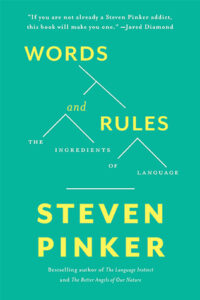 Words and Rules, Steven Pinker
Words and Rules, Steven Pinker
If you’ve read The Language Instinct, you don’t really need to read this book. It’s very much the same theory, with perhaps some different examples, maybe a slightly different slant. Reading it, there was nothing new to me, and I think that it isn’t new because it was all covered in The Language Instinct (though it may be some other books have filled in some gaps in my knowledge before this, in the interim).
Pinker’s work is reasonably easy to read and well-illustrated with examples; he’s very convincing in the way he sets forth his ideas, which does make me rather tempted to find someone who disagrees with him equally convincingly and see what I think after that. Any ideas, friends?
Rating: 3/5
Tags: book reviews, books, non-fiction, science
Posted June 11, 2017 by Nicky in Reviews / 0 Comments
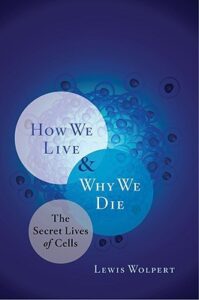 How We Live and Why We Die, Lewis Wolpert
How We Live and Why We Die, Lewis Wolpert
The front of the book blurbs this as ‘a layperson’s guide to the world within us’, and that’s exactly what this is: it’s an accessible, easy to read, whistle-stop tour of cells in the human body, and some of the history surrounding how we’ve come to understand them. If you’ve read almost anything else on the topic, there’s probably nothing new here — but if you’re revising for an exam, you could do worse than spending some time with it. Wolpert manages to explain some complex things very cogently: for example, how enzymes work in breaking bonds, changing molecules, etc.
For me, this was a bit too much of a skimming of the surface — this is stuff I know to the point where I don’t even have to look it up anymore. But for someone not that experienced in biology, or trying to refresh their memory, it’d be perfect.
Rating: 3/5
Tags: book reviews, books, non-fiction, science
Posted June 6, 2017 by Nicky in General / 10 Comments
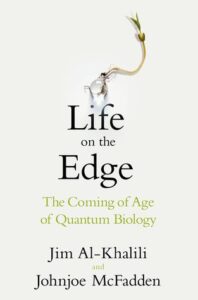 Today’s theme is ten books from [x] genre I’ve added to my TBR. Given that today is my human biology exam (wish me luck!), non-fiction/pop-science seems appropriate here!
Today’s theme is ten books from [x] genre I’ve added to my TBR. Given that today is my human biology exam (wish me luck!), non-fiction/pop-science seems appropriate here!
- Life on the Edge: The Coming of Age of Quantum Biology, by Jim Al-Khalili and Johnjoe McFadden. Quantum biology sounds slightly terrifying, if I’m honest. I understand biology, in general; I don’t understand quantum. But hopefully this book will help, right?
- The Philadelphia Chromosome, by Jessica Wapner. This is about a particular defect found in people in Philadelphia (shocking, I know) which causes cancer, and how it’s contributed to understanding cancer and how to cure it.
- Endless Forms Most Beautiful, by Sean B. Carroll. This has been recommended to me as a good book on “evo-devo”, which is a term I suddenly find cropping up everywhere.
- A Crack in Creation, by Jennifer Doudna and Samuel Sternberg. This is about the gene editing technology CRISPR, which is really fascinating stuff, and apparently this examines some of the ethics of using CRISPR, too. I have high hopes!
- Brain Washing, by Kathleen Taylor. This is one of the Oxford Landmark Science series, which I’m finding a fascinating way of exploring topics I haven’t always read about before.
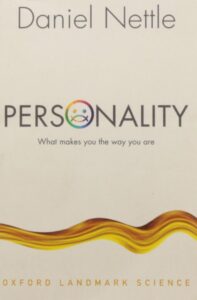
- The Sixth Extinction, by Elizabeth Kolbert. It’s about, well, extinction. I’ve just managed to find this in the library near my parents’ house, so hopefully I’ll be able to read it before I go back to Belgium!
- Vanished Ocean: How Tethys Shaped the World, by Dorrik Stowe. More in the geology/earth science line, but it was recommended in another book I read.
- Shadows of the Mind, by Roger Penrose. I don’t think I’ve read anything by Penrose, so it’s time to fill in a gap. And it’s about brain science!
- Mutants: On the Forms, Varieties and Errors of the Human Body, by Armand Marie Leroi. Right up my street, obviously!
- Personality, by Daniel Nettle. Another one of the Oxford Landmark Science series. How do our brains create personality? Gotta know.
Tags: books, non-fiction, science, Top Ten Tuesday
Posted June 5, 2017 by Nicky in Reviews / 0 Comments
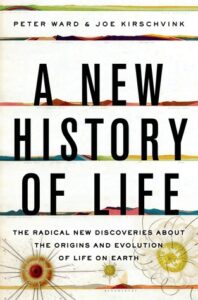 A New History of Life, Peter Ward, Joe Kirschvink
A New History of Life, Peter Ward, Joe Kirschvink
“New” is a bit of an overstatement. It develops themes already covered in books like Nick Lane’s Oxygen (not exactly recent) and David Beerling’s The Emerald Planet; the main contribution to my understanding is a bit more depth on how oxygen and carbon dioxide have limited and unlimited life over the course of its development. The back emphasises the authors’ belief in panspermia, specifically in the form that states life on Earth was seeded from Mars, but there’s very little space devoted to that — and exactly zero actual evidence.
It’s mostly a reasonable read, if not at all “new”, but they badly needed some more time with an editor. They have odd repetitions, or places where they don’t define a word until long after its first use (not a problem for me, but possibly difficult for other pop science readers), and at times the grammar is just terrible. Sentences don’t have subjects, or the verb doesn’t agree, or… It’s not so bad that I’d call it a mess, but I was very conscious that they needed a proofreader or three to make their book feel more professional.
There were some interesting things in here, though: for example, a discussion of different types of lungs and breathing systems. I hadn’t seen that discussed before, and it was fascinating. And for dinosaur aficionados, yep, they definitely touch on dinosaurs and why they once ruled the Earth (and why, perhaps, that rule ended as it did).
Rating: 3/5
Tags: book reviews, books, non-fiction, science
Posted June 4, 2017 by Nicky in Reviews / 0 Comments
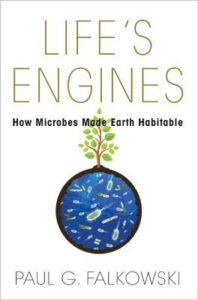 Life’s Engines, Paul G. Falkowski
Life’s Engines, Paul G. Falkowski
This is an accessible book, crystal-clear about all the concepts it discusses. It’s not bad as a revision guide for me, as far as some of my cell bio concepts go; it’d be good for an intelligent layperson. Falkowski writes with assurance, and though there were no surprises here for me, it was still an interesting read.
My only qualm would be that sometimes his choice of words is a little cringy to me. We don’t need “cell stuff”; I’m sure all readers at this level could manage the term “nutrients” or “proteins” or something clearer. Which is funny, given I just said he’s crystal clear — it’s not that the words are confusing, it’s just that they don’t actually make things simpler and easier to understand. They don’t actively obscure, but they do the reader no favours either.
Nonetheless, a book I enjoyed reading.
Rating: 4/5
Tags: book reviews, books, non-fiction, science
Posted June 3, 2017 by Nicky in Reviews / 0 Comments
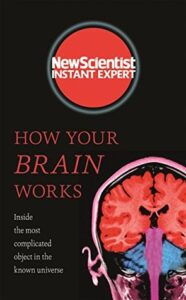 How Your Brain Works, New Scientist
How Your Brain Works, New Scientist
As ever with the New Scientist books, this is a great introduction to a topic — and in this case, it’s a fairly narrow topic: the brain, and how it works. It’s not just a collection of stuff that’s appeared in the other collections, although I think a few of the info boxes and so on did come from other New Scientist publications originally. It’s also based on one of their Instant Expert courses, a great series of events that I do recommend if they cover a topic you’re interested in.
For me, even without my degree, this was a fairly simplistic view of the brain — “instant expert” isn’t quite what you’d become from reading it, I’d feel. “Instantly more informed and able to understand further information with a good foundation,” perhaps.
Rating: 3/5
Tags: book reviews, books, non-fiction, science
Posted May 31, 2017 by Nicky in Reviews / 3 Comments
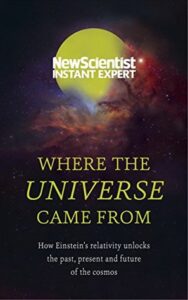 Instant Expert: Where the Universe Came From, New Scientist
Instant Expert: Where the Universe Came From, New Scientist
These books are based on the Instant Expert events that New Scientist hosts on various topics. I’ve been to two of them (one on genetics, one on consciousness), and they’re pretty great: pitched at a level most educated people can understand, but delving a bit deeper into some of the latest events and innovations in whatever area of science they cover. They generally have a panel of experts and, honestly, some pretty good food… Anyway, so I was interested to read this one, even without the good food.
Sadly, it’s more relativity than Big Bang; it’s more worried about how to resolve the issues between quantum physics and relativity than about what we do know. That said, it’s pretty accessible and I did follow most of it, which is more than can be said for most attempts to educate me about relativity. However, it does contain repeated material from New Scientist collections and possibly also previous books; how much, I couldn’t say, since I haven’t read those exhaustively.
Rating: 3/5
Tags: book reviews, books, non-fiction, science
 In Search of the Multiverse, John Gribbin
In Search of the Multiverse, John Gribbin









